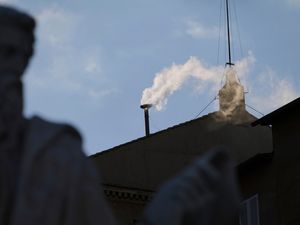'Celebrating the victory of life over death': Empathy, new life and challenges to faith in Bishops' Easter messages
Religious leaders have delivered their traditional Easter messages.
Watch more of our videos on ShotsTV.com
and on Freeview 262 or Freely 565
Rt. Rev. Mark Davies, Bishop of Shrewsbury (Diocese of Shrewsbury)
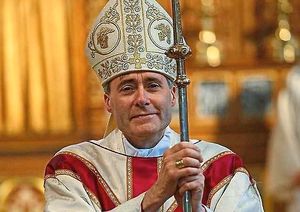
Easter celebrates the victory of life over death and our deepest identity as a nation of Christian foundation. Without Easter we could neither understand ourselves nor thevalues we hold to be right and true. Yet, during the 50 days of Easter celebration this year, Parliament will vote on proposals for the first time in our history, to license doctors and nurses to participate in the death of their patients by directly and intentionally helping them commit suicide.
This proposal which will radically change our relationship to the medical and caring professions is to coincide with the greatest celebration of the Christian Year. Exponents of assisted suicide have blamed the Christian inheritance and the laws flowing from it, for insisting human life be held sacred, and the care of the sick and the frailest is an imperative binding the whole of society.
Christianity can certainly take responsibility for the vision of life which has led us to care for the frailest. The light of Easter made what was unthinkable to the ancients, foundational to the life of our society. The Christian claim that God so loved the world becoming one of us in Jesus Christ, in a love which went as far as the Cross, gave rise to the most transformative development in the whole of our history.
Christians are not of course, alone in valuing human life, but stand with people of many religious beliefs and of goodwill, in holding human life as equally sacred and recognising the binding obligation of selfless care owed to the weakest.
The Terminally Ill Adults (end of life) Bill is not about care or the relief of human suffering, even if the alleviation of pain has long involved in medical practice, the unintended consequence of shortening life. The Bill is about crossing a moral and legal boundary and radically changing our relationship to the medical and nursing professions, from one of exclusive care, to allow killing in the form of assisted suicide.
It is now widely acknowledged that the proposals before Parliament are “dangerously flawed” and we can’t fail to note that considerably more time was devoted to debating fox hunting, than has been given to this seismic change to our society. The Assisted Dying Bill may seek to cast a shadow over the Christian inheritance weshare.
Yet, as night falls on the eve of Easter, fires and candles are lit by Christians in the gathering darkness, to symbolise Christ’s victory in his Resurrection and the light of faith we have received. These gentle flames point to the unfailing Light that has long guided us through all the shadows of history. In this enduring light we once morecelebrate the happiness of Easter.
Rt Revd Sarah Bullock, Bishop of Shrewsbury (Diocese of Lichfield)
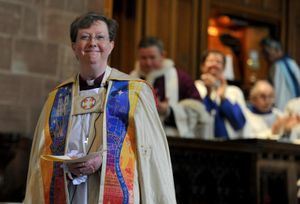
I was recently walking with a group in the borderlands of England and Wales, onpart of the Offa’s Dyke National Trail. As we walked on footpaths alongside andacross fields, through woodland and up towards the hilltops, we passed fields ofgrazing sheep with very young lambs.
It was a typical Easter card scene representing new life and hope and it lifted the heart and the spirit. In a world where it can sometimes feel hard to find encouragement, where we seein our news reports, stories of war and conflict, climate crisis and natural disaster, the abuse of power and influence depriving people of freedom and life chances, God offers us something deeper - hope.
This year, during Lent and Easter, we are encouraged to put down deep roots of hope by connecting with God who is with us at all times. The Church of England’s Lent and Easter theme for 2025 is ‘Living Hope’. In Lent we journey with Jesus onthe difficult and thorny road that leads all the way to the cross on Good Friday – and beyond, to the transformation of Easter Day.
God offers us the opportunity to deepen our hope - we can have hope in times of frustration or uncertainty; the hope found in joining with others; the invitation to notice signs of hope around us; the courage to face reality and pursue a hopeful future; and the way God transforms death into life at Easter.
God invites us to bring to him our own journey through everyday life. In the disappointment of daily setbacks and the pain of deeper hurts, we discover that God is present with us. God promises a future where all things are healed and made new. May you know God’s joy, peace and hope this Easter.
Rt Revd Dr Michael Ipgrave, Bishop of Lichfield
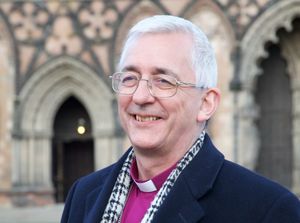
This time five years ago we were all walking more – it was the only exercise most of us could take. I have just finished a ten-day walking pilgrimage that has taken me from Quarnford in the Staffordshire Moorlands to Kinver in the deep south of the same county, and from Llanyblodwel on Shropshire’s border with Wales to Chilcote, east of Tamworth and just into Leicestershire: the compass points of Lichfield Diocese. As I have walked (and just occasionally used my old people’s bus pass to hop onto public transport), accompanied by wonderful people, I have seen beautiful countryside as well as bustling, thriving urban areas – and some places in need of serious tlc. I have visited schools, churches’ homes and community venues, in consistently glorious sunshine for which I’ve been grateful.
I love pilgrimages: walking with a purpose, a destination in mind and a route to follow, not just an aimless wander. As I walk, I find a rhythm deep within, slowing my thoughts, sharpening my senses and gladdening my heart. Walking with others in moments of silence reminds me that we are all the same, sharing the same, flawed humanity. This rhythm is common to all walkers; it means that we prefer to carry on rather than to stop and start!
This pilgrimage has been part of my Lent: thinking about what needs to be rediscovered, put right and with whom, and what more I can do to serve the good of all. Of course, there are really two journeys going on: the journey of my (now slightly sore) feet and the inner journey. I know where my feet are taking me but where is the inner journey going? As i walk, a sense of wellbeing arrives: ‘being’, not ‘doing’, and being able to think more deeply, rather than just reacting. ‘Being’ also encompasses ‘being grateful’ and that also steers my thoughts to others and my prayers for them. It is a great antidote to how people – myself included – so often live: seeking our own good, reacting before thinking, not having a plan.
My physical pilgrimage reached its goal at Lichfield Cathedral on the day before Palm Sunday, and my inner journey has also been towards Easter, towards hope, new life and resurrection. The resurrection of Christ after being crucified, dead and buried. For me, this has been a journey with a purpose towards a hope which is held out to all of us.
Amid the tangled and traumatic events of that week in Jerusalem two thousand years ago, we can see the working out of a plan, foretold in the Bible over more than a thousand years. The resurrection was not a plausible idea thought up to fit the facts afterwards. What provides authenticity and credibility is that Jesus’ great suffering on the cross was suffering with a purpose. His rising from the dead fulfils that plan, and we celebrate that at Easter.
Maybe we would all benefit from going for a walk, slowing down and thinking about this greater purpose. The great plan was not about personal ambition, or for a privileged few but for all people, giving us a hope and a future. Worth a walk?
Rt Revd Matthew Parker, Bishop of Stafford
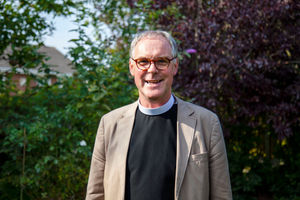
“I was in Paris the other day. I went to see Notre-Dame, you’ve got to see the restored Notre-Dame. It’s fantastic. I almost found God; it was that good. I almost felt He was creeping up on me at one point, but I managed to get out just in time…”
Recent words from Alistair Campbell, podcaster and former Director of Communications under Tony Blair. I like the idea that God may might ambush even the most committed atheist in an unexpected moment of awe and beauty. The destruction by fire of the Cathedral of Notre-Dame of Paris and its wonderful restoration,is an Easter story of death and resurrection, the triumph of love and beauty over the powerof destruction and ugliness.
We live in a world where there is far too much ugliness and pain. This is the age of the “strong man” and the bully; the unprovoked war and the unjust economic system. Too many are poor, oppressed and living in fear. Far too many feel trapped in their own personal Good Friday.
The story of Jesus’ death on a cross reminds us that God shared in that pain and still does. The story of the empty tomb on Easter day tells us that the ugliness and cruelty is not the final word. God’s love triumphs over the powers of darkness and ruin. In the resurrection of Jesus from the dead, God brings beauty from the ashes and restores to life that which isbroken. May the beauty of the resurrection creep up on you this Easter and surprise youwith hope and joy.
Rt Revd Richard Jackson, Bishop of Hereford
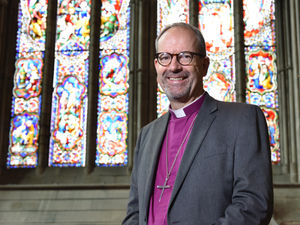
There is nothing better than a good survey to fill the column inches on a slow newsday.
We like to know what the general public thinks, especially now we can comment on it online and tell everyone how wrong they all are! I was fascinated to read asurvey the other day about faith (or lack of it) in Gen Z.
This is the generation bornbetween 1997 and 2012. When I became a Christian 45 years ago, the questions were all about proof: is it true? Over the next few decades that changed to, does itwork? More recently, I thought it had settled at, does it feel good to me?
But the survey showed that for this younger generation some of the classic questions about Christian faith are not as important objections as they once were. For Gen Z (apparently) the most important objection to faith isn’t suffering, or the existence of other religions, or even the churches attitude to LGBTQ people.
The most important was what they saw as lack of evidence for the claims Christians make about God and the historical facts about Jesus’ life, death and resurrection. This is a really important objection. Coming as I do from a scientific background, I’ve never been happy with views of Christian faith as just a subjective feeling, with Jesus as my best mate as long as he organises life in the way I’d like it. It’s striking that the accounts of Holy Week in the Gospels are written with a view to their truthfulness being verifiable.
No reputable historian these days would agree with the silly claim that Jesus was a mythical figure who never existed. There is plenty of comment indocuments outside the Bible that confirm his existence and back up a lot of what hedid.
Jesus makes his arrival in Jerusalem a publicity stunt so there can be no doubt that it’s him who is crucified on Good Friday. The accounts are all slightly different, even difficult to harmonise, which is what you would expect of eye-witness testimony. A put-up job would be much more coherent, especially as it portrays those who would go on to be the pillars of faith as such disloyal idiots.
When it comes to the resurrection, there are only a small number of possible explanations of the absence of the body from the tomb, each of which is much less plausible than what actually happened, which was that Jesus really did rise from the dead.
That changes literally everything. It’s a truth you can base your life on. The word ‘faith’ in popular use is often used to describe believing something, either with no evidence, or despite evidence to the contrary. In the light of the life, death and resurrection of Jesus asreliably reported in the Gospels, Christian faith is staking your life on something you passionately believe to be true. And there’s evidence to prove it.
Rt Revd Martin Gorick, Bishop of Dudley and Acting Bishop of Worcester
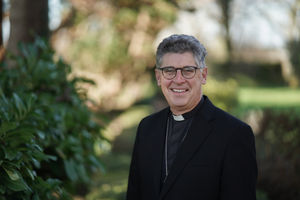
A few years ago, I went on pilgrimage to the Holy Land. It was my first time in Galilee and Jerusalem, and I shall never forget it. Visiting holy sites, seeing the mountains that Jesus knew. Praying with Palestinian Christians and staying with Christians from around the world.
And on the Sunday, very early in the morning, I went to the Church of the Holy Sepulchre. Priests were chanting in Aramaic, the ancient language of Jesus. I was longing to go into the sepulchre itself, a tiny chapel built over the site where Jesus had been buried after his death on the cross. Even at that time I had to queue, and it was touch and go whether I would get in at all with services about to start.
But then it was my turn, and I stooped to go inside, through the tiny entrance door. Just as the Mary Magdalene and the others had done that first Easter Day. I had a few seconds only, to take in the stone slab, and the icons and flickering candles inside. And then I heard the words sound clearly in my mind, ‘He is not here. He is Risen!’
Risen to reign as Lord and King. Risen to go before those first disciples to Galilee. Risen to go before us into every situation.
Happy Easter! Jesus Christ is Risen today. Alleluia!
Rt Revd Tim Wambunya, Bishop of Wolverhampton
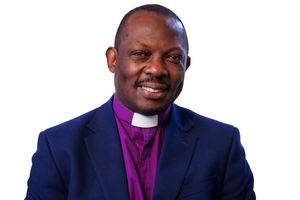
Surprise! The birthday party call to the birthday boy or girl is pitched just right.
We love that kind of surprise although there is a fine line between a joyful surprise and an embarrassing near-miss. One of the most prominent of life’s current unexpected surprises has to be the tariffs being imposed on goods exported to the USA which could have serious effects on businesses and lives in the Black Country.
There are many events which are more local with the same capacity to garner ‘shock’ headlines: Wolves losing 2-6 to Chelsea last year, as well as numerous personal pieces of news which get less prominence but are more devastating. For many people living in the Black Country that includes news from abroad that tells of things affecting family living elsewhere, whether that is Krakow, Karachi or Kingston, Jamaica. Is any news good news any more?
What’s that got to do with Easter? Recent experience makes us surprisingly well placed to understand the events of the first Easter and the reactions to them. Someone whose followers thought he was taking them in a fresh new direction, who seemed to have remarkable qualities and who drew people to him had left the stage.
Jesus’s disciples were bewildered by his crucifixion, by the crowd’s preference for a common criminal as recipient of their favour and by how speedily their expectations of today, let alone tomorrow, were smashed.
It’s unusual to find something that looks shocking at first sight but turns out to be good news. Silver linings are in short supply, but they do happen. Five years ago, we were looking for silver linings in the early days of the pandemic.
For many of us, it was a time when we rediscovered walking and our localities, our neighbours and who offered help or who needed it. We saw, through our own experience, who put the needs of others high on their agenda. The disciples carried on with what they had made their lives into even when bewildered and uncertain following Jesus death on the cross. What they were made of and what made them tick was what kept them going.
Little did they know that their bewilderment would be short-lived and that Jesus would rise from the dead, show himself to them and turn everything upside down again. Surprise doesn’t cover this. It’s the deepest, greatest, most joyful turnaround in history. It has redounded for two thousand years. Another surprise is that young people are, according to a survey, turning to Christianity again and have made the Bible the best-selling book in their age group.
This news is worth more than a passing glance, given the strenuous efforts of people to claim that religion is dead over recent decades. Certainly, our churches had a good Christmas last year with many surprisingly full. Perhaps it's time for us all to re-examine the claims of faith and then decide how you greet the surprise of the resurrection?




